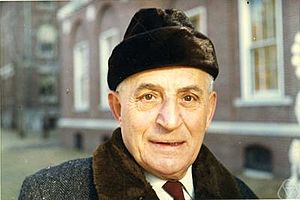Oscar Zariski facts for kids
Quick facts for kids
Oscar Zariski
|
|
|---|---|

Oscar Zariski (1899–1986)
|
|
| Born |
Russian: О́скар Зари́сский
April 24, 1899 Kobrin, Russian Empire
|
| Died | July 4, 1986 (aged 87) Brookline, Massachusetts, United States
|
| Nationality | American |
| Alma mater | University of Kyiv University of Rome |
| Known for | Contributions to algebraic geometry |
| Awards | Cole Prize in Algebra (1944) National Medal of Science (1965) Wolf Prize (1981) Steele Prize (1981) |
| Scientific career | |
| Fields | Mathematics |
| Institutions | Johns Hopkins University University of Illinois Harvard University |
| Doctoral advisor | Guido Castelnuovo |
| Doctoral students | S. S. Abhyankar Michael Artin Iacopo Barsotti Irvin Cohen Daniel Gorenstein Robin Hartshorne Heisuke Hironaka Steven Kleiman Joseph Lipman David Mumford Maxwell Rosenlicht Pierre Samuel Abraham Seidenberg |
Oscar Zariski (born April 24, 1899 – died July 4, 1986) was a very important mathematician. He was born in Russia but became an American citizen. He is known as one of the most influential experts in a field called algebraic geometry during the 20th century.
Contents
Early Life and Education
Oscar Zariski was born Oscher Zaritsky to a Jewish family. He started studying at the University of Kyiv in 1918. In 1920, he moved to Rome, Italy, to continue his studies at the University of Rome.
In Rome, he learned from famous Italian mathematicians like Guido Castelnuovo, Federigo Enriques, and Francesco Severi. These teachers were part of a special group known as the Italian school of algebraic geometry.
In 1924, Zariski finished his PhD. His main teacher, Castelnuovo, suggested the topic for his research. When his PhD paper was published, he changed his name to Oscar Zariski.
Working at Johns Hopkins University
In 1927, Zariski moved to the United States. He got a job at Johns Hopkins University and became a professor there in 1937.
During his time at Johns Hopkins, he wrote an important book called Algebraic Surfaces. This book summarized the work of the Italian mathematicians he had studied with. It was first published in 1935. Many years later, in 1971, it was reissued with new notes from his students. These notes showed how much the field of algebraic geometry had grown and changed. The book is still a key reference for mathematicians today.
Zariski wasn't completely happy with how the Italian mathematicians approached some areas of geometry. He wanted to make the field more exact and precise. He used a branch of mathematics called commutative algebra to do this. He also developed a concept known as the Zariski topology, which is a way to describe how points are "close" to each other in algebraic geometry.
Teaching at Harvard University
After spending a year at the University of Illinois at Urbana–Champaign (1946–1947), Zariski became a professor at Harvard University in 1947. He stayed at Harvard until he retired in 1969.
At Harvard, Oscar Zariski taught many students who later became very famous mathematicians themselves. Some of his notable students included Shreeram Abhyankar, Heisuke Hironaka, David Mumford, Michael Artin, and Steven Kleiman. These students went on to make big advancements in different areas of mathematics.
Zariski himself continued to work on complex problems in algebraic geometry. His ideas, like Zariski's main theorem, were very important. They helped other mathematicians, especially Alexander Grothendieck, to create a unified and powerful way of understanding algebraic geometry. In 1958, Zariski also came up with the first example of a Zariski surface, which is a special type of surface in mathematics.
Awards and Recognition
Oscar Zariski received many honors for his work.
- In 1944, he was chosen to be a member of the United States National Academy of Sciences.
- He also joined the American Academy of Arts and Sciences in 1948 and the American Philosophical Society in 1951.
- He won the Cole Prize in Algebra in 1944.
- In 1965, he was awarded the National Medal of Science, which is one of the highest scientific honors in the United States.
- In 1981, he received the Steele Prize and the Wolf Prize in Mathematics, sharing the Wolf Prize with another mathematician, Lars Ahlfors.
Zariski also wrote other important books, including Commutative Algebra in two volumes, with his co-author Pierre Samuel. His collected papers have been published in four volumes. In 1997, a special conference was held in Austria to honor his contributions to mathematics.
See also
 In Spanish: Oscar Zariski para niños
In Spanish: Oscar Zariski para niños
- Zariski ring
- Zariski tangent space
- Zariski surface
- Zariski topology
- Zariski–Riemann surface
- Zariski space (disambiguation)
- Zariski's lemma
- Zariski's main theorem
 | John T. Biggers |
 | Thomas Blackshear |
 | Mark Bradford |
 | Beverly Buchanan |

